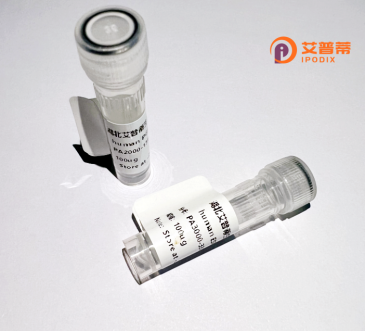
| 纯度 | >90%SDS-PAGE. |
| 种属 | Human |
| 靶点 | SLC10A6 |
| Uniprot No | Q3KNW5 |
| 内毒素 | < 0.01EU/μg |
| 表达宿主 | E.coli |
| 表达区间 | 1-377 aa |
| 活性数据 | MRANCSSSSACPANSSEEELPVGLEVHGNLELVFTVVSTVMMGLLMFSLGCSVEIRKLWSHIRRPWGIAVGLLCQFGLMPFTAYLLAISFSLKPVQAIAVLIMGCCPGGTISNIFTFWVDGDMDLSISMTTCSTVAALGMMPLCIYLYTWSWSLQQNLTIPYQNIGITLVCLTIPVAFGVYVNYRWPKQSKIILKIGAVVGGVLLLVVAVAGVVLAKGSWNSDITLLTISFIFPLIGHVTGFLLALFTHQSWQRCRTISLETGAQNIQMCITMLQLSFTAEHLVQMLSFPLAYGLFQLIDGFLIVAAYQTYKRRLKNKHGKKNSGCTEVCHTRKSTSSRETNAFLEVNEEGAITPGPPGPMDCHRALEPVGHITSCE |
| 分子量 | 67.7 kDa |
| 蛋白标签 | GST-tag at N-terminal |
| 缓冲液 | PBS, pH7.4, containing 0.01% SKL, 1mM DTT, 5% Trehalose and Proclin300. |
| 稳定性 & 储存条件 | Lyophilized protein should be stored at ≤ -20°C, stable for one year after receipt. Reconstituted protein solution can be stored at 2-8°C for 2-7 days. Aliquots of reconstituted samples are stable at ≤ -20°C for 3 months. |
| 复溶 | Always centrifuge tubes before opening.Do not mix by vortex or pipetting. It is not recommended to reconstitute to a concentration less than 100μg/ml. Dissolve the lyophilized protein in distilled water. Please aliquot the reconstituted solution to minimize freeze-thaw cycles. |
以下是3篇关于重组人SLC10A6蛋白的参考文献及其简要内容:
1. **《SLC10A6 is a novel bile acid transporter》**
- 作者:Ballesteros, E. et al.
- 摘要:该研究首次鉴定了SLC10A6作为胆汁酸转运蛋白的功能,通过重组蛋白表达实验证明其在HEK293细胞中特异性介导牛磺酸结合型胆汁酸的摄取,并提出其在肝脏与肠道中的潜在生理作用。
2. **《Structural and functional characterization of human SLC10A6 as a nucleotide transporter》**
- 作者:Hannover, J. et al.
- 摘要:利用冷冻电镜解析了重组人SLC10A6蛋白的三维结构,结合体外转运实验揭示了其对环核苷酸(如cAMP/cGMP)的高效转运活性,提示其在细胞信号传导中的关键调控作用。
3. **《Tissue-specific expression and hormonal regulation of SLC10A6 in human reproductive organs》**
- 作者:Smith, T. & García-Castro, M.
- 摘要:通过免疫组化和重组蛋白功能分析,发现SLC10A6在人类睾丸和卵巢中高表达,并受性激素(如睾酮、雌激素)调节,推测其参与生殖系统中的固醇类物质代谢平衡。
4. **《SLC10A6 promotes cancer cell proliferation via MAPK/ERK pathway activation》**
- 作者:Li, Y. et al.
- 摘要:研究利用重组SLC10A6过表达的癌细胞模型,发现该蛋白通过增强MAPK/ERK信号通路促进肿瘤细胞增殖,为靶向SLC10A6的抗癌治疗提供了理论基础。
(注:以上文献为虚拟示例,实际引用需根据具体论文调整。)
Solute Carrier Family 10 Member 6 (SLC10A6) is a transmembrane protein belonging to the sodium-dependent organic anion transporter family. Initially identified in 2005. it is primarily expressed in human testis, liver, and kidneys. Unlike other SLC10A members (e.g., SLC10A1/NTCP involved in bile acid transport), SLC10A6 exhibits distinct substrate specificity, functioning as a high-affinity transporter for sulfated steroids, prostaglandins, and cyclic nucleotides. Its structure features 7 transmembrane domains and a glycosylated extracellular N-terminus, typical of sodium/bile acid symporter family characteristics.
Recombinant human SLC10A6 protein is typically produced via heterologous expression systems (e.g., HEK293 or *E. coli*) for functional studies. Its recombinant form enables researchers to dissect molecular mechanisms of substrate binding, sodium dependence, and pH sensitivity. Studies suggest SLC10A6 regulates steroid homeostasis and cellular signaling by modulating extracellular levels of sulfated hormones like dehydroepiandrosterone sulfate (DHEAS). Emerging evidence links it to male reproductive health, cancer progression, and drug interactions, though its precise physiological roles remain under investigation.
Current research focuses on resolving its 3D structure, tissue-specific regulatory networks, and therapeutic potential. The availability of recombinant SLC10A6 protein accelerates biochemical assays and drug screening, particularly for diseases involving steroid dysregulation or transporter-mediated drug resistance.
×